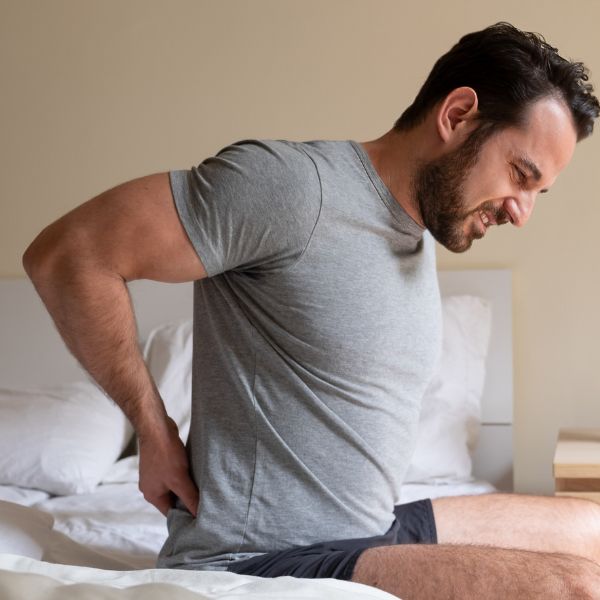
Did you know?
But back and neck pain don’t have to be a fact of life.
At Progressive Sports and Spinal Physiotherapy, we work with you to get to the cause of your pain and provide effective treatments that bring relief.


Your back is a complex system of vertebrae, discs, nerves, ligaments, tendons and muscles. It keeps you upright, helps you walk and gives you an amazing range of movement and strength – that is, until something goes wrong.
As you can imagine, there are many causes and kinds of back pain, so an accurate assessment is key to getting the right treatment and finding relief.
When you come to our clinic, your physiotherapist will get to know your history, take you through a thorough assessment process and answer any of your questions.
Once we have an accurate picture of your condition we:
Our qualified physiotherapists successfully treat a whole range of back injuries and chronic conditions.

Your neck is highly mobile and flexible. These qualities give you great range of movement, but they also leave your neck vulnerable to injury.
Sudden changes of movement, like in a car accident or on the sporting field, as well as the awkward postures we adopt when sitting at a desk or computer for long hours, can wreak havoc with our necks.
Neck pain can be highly acute, and is heightened by muscle spasms designed to protect your spinal cord from further injury. It can also be caused by many factors.
At Progressive Sports and Spinal Physiotherapy, we understand the complexities of neck pain and know that a proper assessment is key to getting the best treatment and finding relief.
Your physiotherapist will:
While gentle hands-on therapy is a highly successful way to treat neck pain and can bring fast relief, long-term self-management, is also vital.

Neck and back problems can get worse and take more time to treat the longer you leave them. If you or a family member is experiencing back or neck pain, don’t wait – get help from an experienced physiotherapist. You can be confident our qualified and highly skilled physiotherapists will get to the source of your pain, recommend the best treatment options and bring relief.
Call Progressive Sport and Spinal Physiotherapy today on 4721 7798 or email: info@progressiverehab.com.au
At Progressive Sports and Spinal Physiotherapy Penrith, we are able to assess, treat, educate and manage all musculoskeletal injuries. We focus on hands-on treatment, exercise prescription and self management techniques tailored to your specific needs. We utilise evidence based treatments to maximise your outcomes.
USEFUL LINKS
CONTACT US
Elin, is an alumni of St. Edward’s University and holder of a Bachelor’s degree in Kinesiology, furthered her academic journey by attaining a Doctor of Physiotherapy from Macquarie University in 2022.
Her passion for sports, particularly football (soccer), is evident in both her academic pursuits and personal endeavors. Specialising in the comprehensive well-being of athletes, Elin focuses on restoring them to peak performance while actively preventing future injuries.
Elin’s professional expertise is centered on musculoskeletal rehabilitation, with a specific emphasis on addressing and preventing knee injuries. Her approach integrates expert treatment with a commitment to educating and empowering patients, fostering their active involvement in enhancing their health and overall quality of life.
As an active participant in NPL football with SD Raiders, Elin brings firsthand experience and a profound understanding of the sport’s demands. Beyond the field, she extends her influence by contributing sports coverage over the weekends.
Christopher (Chris) Han graduated from the University of Sydney with a Bachelor’s Degree in Occupational Therapy, and then completed the Doctor of Physiotherapy program at Macquarie University in 2018. Chris is currently undertaking his PhD at the University of Sydney and Institute for Musculoskeletal Health in the field of low back pain and is due to complete this in early 2024.
Chris is currently an assistant Physiotherapist for the NRL Referees. Chris has previous experience as the head Physiotherapist at Panthers Premier League Netball and a number of elite sporting athletes in the private setting.
Through Chris’ experiences, he has a particular interest in all areas of the body and musculoskeletal physiotherapy, sports, vestibular rehabilitation, and Men’s Health (pre and post prostate surgery).
Suzanne graduated from Western Sydney University with a Bachelor of Health Science (Sports and Exercise Science) in 2015. She then went on to continue her studies at Macquarie University graduating from the Doctor of Physiotherapy post-graduate degree in June 2019.
Since graduating, Suzanne has worked in the local Penrith area in both private practice and Sports Physiotherapy. Suzanne has worked with sporting teams including Penrith District Netball Association, Mt Druitt Rangers (NPL), Penrith Valley Figure Skating Club, and local dance and cheer schools.
Suzanne has a particular interest in working with artistic athletes including cheerleaders and dancers. She has a professional background in both cheer and dance and has previously worked as both a cheer coach and dance teacher. Suzanne’s previous experiences are an invaluable resource to her as a physiotherapist, as she has a thorough understanding of the level of physical fitness and skill acquisition that these athletes must have in order to be successful on stage and in competition.
Suzanne’s other areas of clinical interest reside in lower limb musculoskeletal injuries, spinal pathologies and women’s health.
Nathanial graduated as a physiotherapist in 2012 which saw him work in private practice and hospital settings gaining experience in all areas of physiotherapy including hand therapy, splinting/casting, pre/post-operative care, Men’s Health and general musculoskeletal, occupational and sports physiotherapy. Since then he has gone on to complete further studies in physiotherapy enabling him to be the only dual titled Musculoskeletal, Sports and Exercise Physiotherapist in Penrith.
Nathanial has a strong background in sports physiotherapy achieving accreditation with NSWIS as a service provider and working with many elite sports teams.
Nathanial has a particular interest in working with elite athletes, complex cases and in particular assessment and management of knee, hip and shoulder pain.
Andrea graduated from the Australian Catholic University completing her Bachelor of Exercise and Sports Science in 2018 and Master’s of Clinical Exercise Physiology in 2020. After graduating she attained accreditation with ESSA as an Exercise Physiologist.
During her studies she gained clinical experience in both hospital and private practice settings, in cardiac rehabilitation, neurological conditions, cancer and chronic musculoskeletal injuries.
Since working at Progressive, Andrea has a specialist interest in treating musculoskeletal injuries, helping people in the mid-late stage of rehab to get them to return to sport or work. As well as helping people manage chronic conditions such as arthritis, osteoporosis and diabetes.